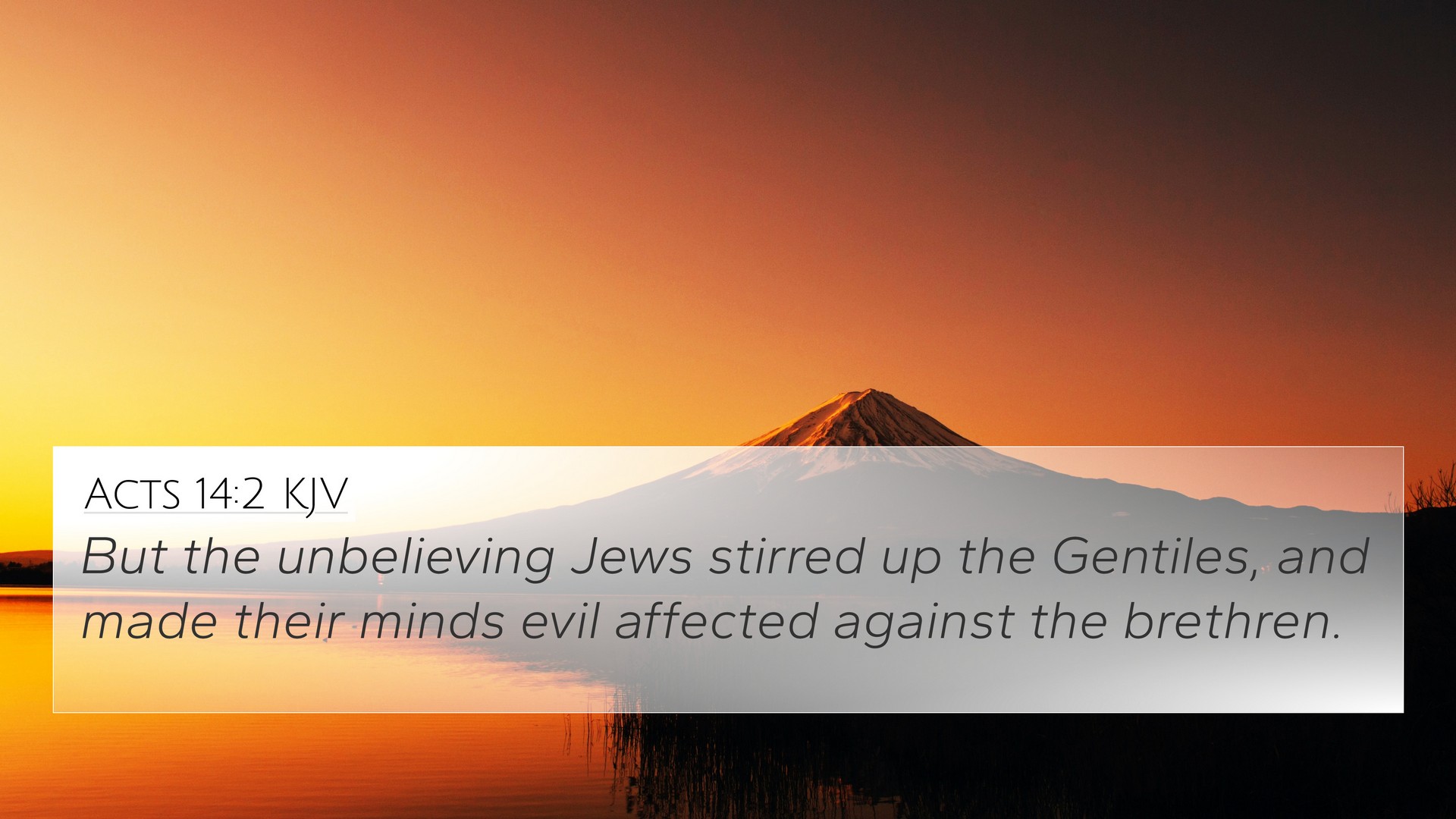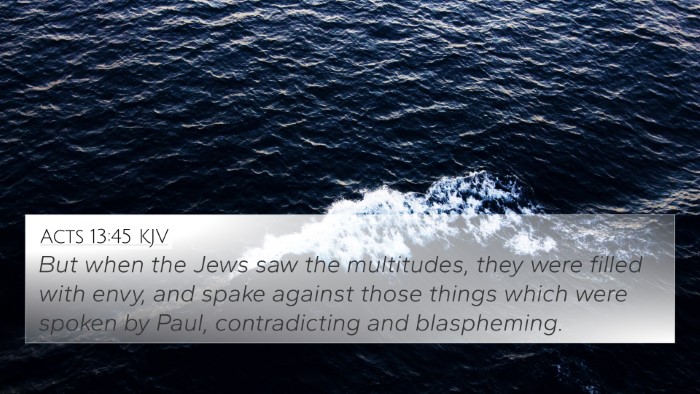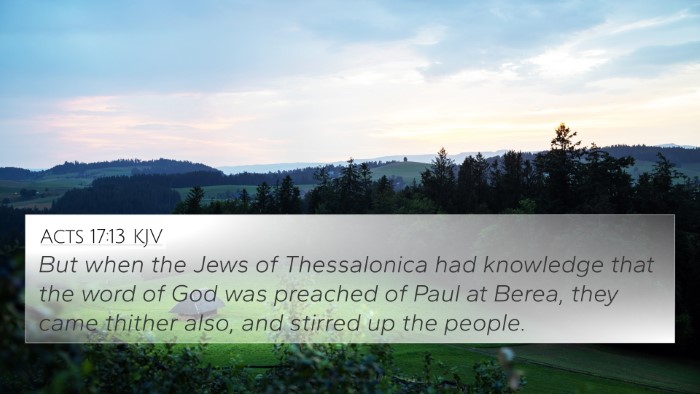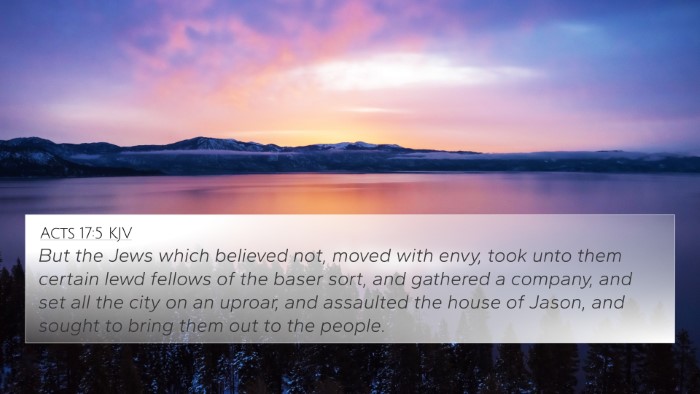Understanding Acts 14:2
Acts 14:2 states: "But the unbelieving Jews stirred up the Gentiles and poisoned their minds against the brethren." This verse provides a glimpse into the early Christian mission faced with opposition and hostility.
Contextual Overview
In order to grasp the full meaning of Acts 14:2, one must consider the setting in which the apostle Paul and Barnabas are ministering. They traveled to Iconium, where they preached the word of God, drawing both believers and dissenters. The tension arises from the divide between the believing and unbelieving factions within the community.
Commentary Insights
Various public domain commentaries shed light on multiple aspects of this verse:
- Matthew Henry emphasizes the dual nature of response to gospel preaching—faith and opposition. He notes that the bitterness of the unbelieving Jews incites division among the Gentiles, showcasing the struggle between belief and disbelief.
- Albert Barnes adds that the Jews' actions were not merely passive resistance; they actively sought to influence others against the brethren. His analysis points out the psychological warfare employed to dissuade potential converts from accepting the gospel.
- Adam Clarke elaborates on the term "poisoned their minds," suggesting that the Jews resorted to slander and false accusations, highlighting the destructive power of misinformation in the context of faith.
Thematic Connections
This verse illustrates several significant themes in the Bible:
- The Conflict of Faith: Acts 14:2 reflects a common theme in scripture where believers are met with hostile opposition, echoing struggles in the Old Testament.
- Spiritual Warfare: The dynamic of belief versus unbelief highlights the ongoing spiritual battle, which is further expanded in Ephesians 6:12, where Paul speaks of wrestling against spiritual forces.
- Community Division: The verse speaks to how differing beliefs can fracture relationships within a community, as seen in Galatians 5:15.
Related Bible Cross-References
To gain a deeper understanding of Acts 14:2, we can link it with several other Bible verses:
- Matthew 10:14 - Jesus instructed His disciples about facing rejection, paralleling Paul and Barnabas's experience.
- John 15:18-19 - Jesus warned of hatred from the world, which resonates with the treatment Paul and Barnabas received.
- Acts 4:17-20 - The apostles face similar opposition, demonstrating the cyclical nature of resistance faced by believers.
- 2 Timothy 3:12 - "Indeed, all who desire to live a godly life in Christ Jesus will be persecuted," providing a broader context of suffering for righteousness' sake.
- Romans 1:16 - Paul asserts the power of the gospel as he encounters both acceptance and rejection in his ministry.
- 1 Corinthians 1:18 - The message of the cross is foolishness to those who are perishing, highlighting the stark contrast of belief.
- Galatians 4:17 - A warning against those who seek to influence others away from the truth, parallel to the Jews' actions in Acts.
- Matthew 16:23 - Reflecting on opposition from one's own countrymen, which Paul experienced in Iconium.
- 2 Thessalonians 3:2 - Requesting prayers for deliverance from unreasonable individuals, akin to the Jewish opposition the apostles faced.
- 1 Peter 5:8 - An exhortation to be sober-minded, as adversary roams like a roaring lion, which complements the atmosphere of persecution in Acts.
Tools for Bible Cross-Referencing
To delve deeper into the connections between verses like Acts 14:2 and the referenced scriptures, consider utilizing:
- Bible Concordance: An alphabetical listing of words with references to biblical passages, helping you locate desired verses quickly.
- Bible Cross-Reference Guide: A resource that maps related verses to bolster understanding during study.
- Bible Reference Resources: Digital or print aids that summarize connections between various scriptural texts, enhancing comprehensive study efforts.
Conclusion
Acts 14:2 serves as a compelling reminder of the challenges faced by early Christians and the timeless struggle against opposition. By utilizing cross-references and exploring parallel themes across scripture, believers can gain invaluable insights into the nature of faith, community, and spiritual perseverance.












